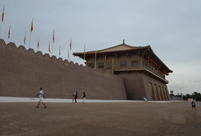 In pics: YOG prism
In pics: YOG prism
 Amputee girl reaches top of half-left tower in Jiangxi
Amputee girl reaches top of half-left tower in Jiangxi
 Yardangs in Lop Nur
Yardangs in Lop Nur
 Intoxicating Ayding Lake in Xinjiang
Intoxicating Ayding Lake in Xinjiang
 Beijing's MJ impersonator a 'thriller' for crowds
Beijing's MJ impersonator a 'thriller' for crowds
 Armed police compete on the plateau
Armed police compete on the plateau
 Rubber Duck settles in Guiyang new urban area
Rubber Duck settles in Guiyang new urban area
 Rare set of giant panda triplets turn one month old
Rare set of giant panda triplets turn one month old
 Closing ceremony of Youth Olympic Games
Closing ceremony of Youth Olympic Games
 Attractive posters to welcome freshmen
Attractive posters to welcome freshmen
RISING AWARENESS
Zhang credited the rapid development of organ donations to tireless awareness efforts by the government and media.
According to results of a Beijing survey he launched in 2012, the majority of 2,000-plus respondents said they recognized organ donation, although not all of them were ready to donate their own.
"There's no short cut to attract donors. You have to advertise heavily and invite media to eulogize selflessness," said Li Jindong, who heads the organ donation office of Guangdong branch of RCS.
In China, organs of a deceased can only be extracted after his or her immediate family agree, regardless if the donor is registered before death.
"So the family's attitude matters. From our observation, if they have knowledge about donation, it'll save us a lot of effort in persuasion. If they don't, we're very likely to lose the potential donor," Li said.
He noted that the office sees an influx of calls inquiring about donor registry after donors' touching stories make headlines.
The number of citizens in Guangdong who have donated organs accounts for a fifth of the country's total.
Some local branches of RCS provide funds to help impoverished donors pay medical bills and funeral fees. Although the idea was initiated by the government, it has aroused doubts over cash-for-organ.
Li believes the practice, exclusive to China, will eventually fade away due to continuous improvement of the health insurance network.
KNOTTY CHALLENGES
The yawning supply-demand gap has put great pressure on those dedicated to organ donation promotion, but breaking traditions remains a hard nut to crack despite incremental progress.
The biggest obstacle is the belief that people should be buried or cremated, which is shared by many eastern countries, Zhang said.
"Families of some donors repeatedly told us not to publicize their kindness because they fear gossip from acquaintances," he said, adding that some who died waiting for organs that never came were unwilling to give their organs to others.
He Xiaoshun, vice president of the First Affiliated Hospital of Sun Yat-sen University in Guangdong, complained about a requirement that the spouse, parents and adult children of a donor must sign an agreement before the organs are taken.
The requirement is understandable since the cause is still at a fledgling stage in the country. "But sometimes it just wastes precious time, which should have been used to save lives," he said.
He said donor registry in China "still has a very, very long way to go" In the United States, 48 percent of adults are registered organ donors while some 27,000 out of 1.3 billion Chinese people are on the registry, He said.
Li Qingsheng, head of the OPO office in the No. 1 people's hospital in Guangdong's Foshan City, said a successful method in foreign countries is asking new drivers if they want to register as donors when registering their license and mark their licenses with "Organ Donor" if they say yes.
"But it may not be viable here. Broaching the subject under that circumstance would be offensive to many Chinese who are uncomfortable talking about death," Li said.
In addition, given the fragile trust between doctors and patients, Li said, many may fear doctors would not try their best to save their lives if driving licenses show they are organ donors.
The government has launched an arduous fight against rampant illegal organ trafficking, as a result of organ scarcity. Last week, a Beijing court ruled on the country's largest case in kidney trading, with 51 kidneys and several doctors involved.
 |
 Models with two-dimensional codes painted on bodies
Models with two-dimensional codes painted on bodies Antique exhibition of Maritime Silk Road held in Jinan
Antique exhibition of Maritime Silk Road held in Jinan NASA releases images of solar flare
NASA releases images of solar flare Daming Palace in Chang’an City in photos
Daming Palace in Chang’an City in photos Babies of celebrities born in the year of horse
Babies of celebrities born in the year of horse Farmer Painting, one of Ansai's Three Strange Wonders
Farmer Painting, one of Ansai's Three Strange Wonders Special holidays
Special holidays World's top 10 fighters
World's top 10 fighters 'Stewardesses' serve in hospital
'Stewardesses' serve in hospital The biggest duty-free store of the world
The biggest duty-free store of the world Volunteers bid farewell to YOG
Volunteers bid farewell to YOG More police dogs join anti-terror campaign in Inner Mongolia
More police dogs join anti-terror campaign in Inner Mongolia Picturesque Dayilan Manchu village in NE China
Picturesque Dayilan Manchu village in NE China Athletes experience the charm of Chinese traditional opera in Nanjing
Athletes experience the charm of Chinese traditional opera in Nanjing Contestants for Miss Bikini World experience Chinese traditional culture
Contestants for Miss Bikini World experience Chinese traditional cultureDay|Week|Month